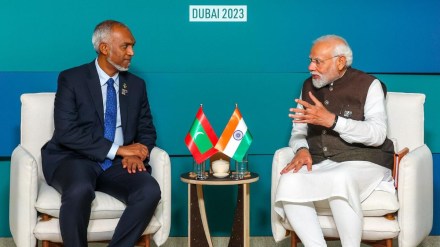Shiv Bhagwan Saharan
A diplomatic dispute erupted between the Maldives and India following derogatory comments made by three brash deputy ministers of the Maldivian government on social media against India and Prime Minister Narendra Modi. Additionally, the three deputy ministers used offensive language against PM Modi in posts on ‘X’ (formerly Twitter) about his trip to the Lakshadweep Islands, celebrating the natural beauty of the islands and implying an attempt to promote the Union Territory as an alternative tourist destination to the Maldives. These comments sparked outrage on Indian social media, leading to calls for a boycott of the Maldives. Also, the two former Maldivian Presidents, Ibrahim Solih and Mohamed Nasheed, along with the Maldives Tourism Industry, strongly condemned the deputy ministers’ remarks. The Muizzu government distanced itself from the comments and suspended the three deputy ministers before departing for his maiden visit to Beijing. Subsequently, when both High Commissioners were summoned by their respective governments, the Indian High Commissioner was informed that the derogatory remarks made by the three deputy ministers against PM Modi do not represent the views of the Maldivian government.
Meanwhile, in upholding sovereign rights and the will of the people, both governments cannot afford to keep a distance and let bilateral relations deteriorate. Such a scenario would result in serious political, economic, security, and geostrategic consequences. As a smaller nation, the Maldives would bear the brunt of these impacts, particularly if it sours relations with one of its major development partners. This outcome would not align with India’s interests either, as India views the Maldives as a crucial neighbour, especially in the context of maritime security.
Due to its strategic position in the Indian Ocean, the Maldives historically attracted the attention of Dutch, Portuguese, and French explorers during the 16th and 17th centuries. Subsequently, it fell under British geo-economic and geo-strategic influence, leading to the signing of a Treaty of Friendship and Cooperation with the British in 1887. While the Victorian administration effectively managed Maldivian foreign affairs, the nation maintained its internal political sovereignty. During the Second World War, the Maldives served as a British naval base and remained a British protectorate until gaining independence in 1965.
Bilateral Relations and Diplomatic Milestones
After becoming an independent state, the Maldives joined the UN in 1965 and established diplomatic relations with India, Pakistan, and Sri Lanka, particularly with the latter. This is unsurprising, given the shared maritime border between the two nations, which has been properly delineated. India has consistently supported the Maldives during crucial times, being the first to recognize its independence from British rule in 1966. Also, India took the initiative by establishing a resident mission in Male in 1976. In 1978, the Indian International Airport Authority (IIAA) secured a contract to expand the Hulhule airport runway. Following that, India and the Maldives entered into a friendship treaty to enhance the strength of their bilateral relationship in 1981. In 1998, India deployed troops to assist then-President Abdul Gayoom in thwarting a coup attempt.
Apart from Operation Cactus, India extended assistance to the Maldives during a severe water crisis in 2014 following the collapse of the island’s sole water treatment plant. Heavy-lift transporter planes, such as the C-17 Globemaster and the IL-76, were deployed to deliver bottled water, and ships equipped with onboard desalination plants were also sent to provide fresh water. Moreover, the Maldives also relies on India for essential supplies such as rice, vegetables, medicines, and humanitarian assistance. India has consistently viewed the Maldives as a pivotal partner in both development and maritime security, assisting in these domains since the 1980s. However, a temporary pause in bilateral engagement occurred during the Yameen government from 2013 to 2018, due to the anti-India stance of the ruling party Progressive Party of Maldives (PPM). Substantial improvements in bilateral relations were observed following the change in government in the Maldives in 2018.
However, India extended comprehensive cooperation to Solih’s Government from 2018 to 2023, aligning with India’s PM Modi ‘Neighborhood First’ policy and maritime doctrine, the Vision for ‘Security and Growth for all in the region (SAGAR).’ In retrospect, it might have been imprudent for India not to engage with the PPM-People’s National Congress (PNC) coalition, then in the opposition. Nevertheless, post the regime change in 2023, the Indian government has expressed its readiness to collaborate with the ruling PPM-PNC coalition.
Recent developments and withdrawal of Indian troops by March 15
On January 14, 2024, Maldivian President Mohamed Muizzu formally requested that India withdraw all of its military personnel from the Maldives by March 15 and end the agreement with the Indian navy for a hydrographic survey of its waters. The request was raised during discussions between senior delegations from both nations at the foreign ministry. Currently, there are approximately 70 Indian troops, two HAL Dhruv helicopters, and a Dornier 228 maritime patrol aircraft stationed in the Maldives. The withdrawal of Indian troops was a significant focal point during Muizzu’s party campaign. President Muizzu also stated that he received the mandate to remove Indian military troops and aims to improve self-reliance.
Despite diplomatic challenges, India and the Maldives have traditionally maintained strong ties, with historical instances of Indian assistance during crucial times. The current diplomatic dispute presents complexities, but the potential consequences highlight the need for diplomatic resolution and the preservation of strong bilateral ties for mutual benefit. Also, India’s diplomatic dispute with the Maldives would likely be resolved through dialogue and negotiations.
The author is a Doctoral Candidate at the School of International Studies (SIS), Jawaharlal Nehru University, New Delhi. He tweets at @ShivBhagwan_JNU
Disclaimer: Views expressed are personal and do not reflect the official position or policy of Financial Express Online. Reproducing this content without permission is prohibited.
